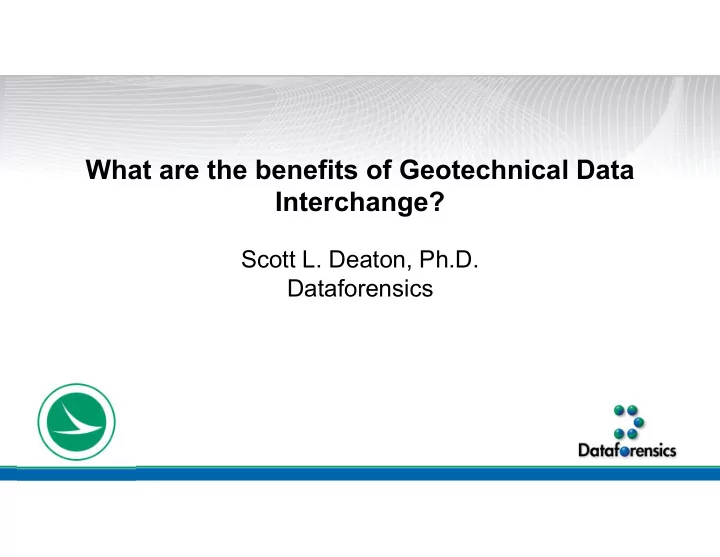

What are the benefits of Geotechnical Data Interchange? Scott L. Deaton, Ph.D. Dataforensics
Alexa Google Assistant Siri Cortana AI Big Data
Challenge 1 What is Geotechnical Data?
Geotechnical Data “facts or figures obtained from all phases of a geotechnical project, including derivations from other data NOTE Facts and figures might include text, numbers and formulae.” Source: BS 8574:2014 Code of practice for the management of geotechnical data for ground engineering projects
Data or Information If you can process it into one or more formats without re-inputting it or without using multiple cut and paste operations You have data
Data or Information If not … You have information
Quiz - Have you been given Information or Data?
Data or Information? PDF borehole log
You have Information
Data or Information? A DIGGS data file An AGS data file
You have Data!
Not Data PDF borehole logs (Not Data)
Overview Dataforensics hired by Ohio DOT to review OGE internal processes and consultant processes Goals: Review and provide recommendations for how to improve OGE processes Identify where DIGGS fits into the OGE processes and consultants processes
Why do we care about data? How would you feel if you were told to re-type the N-Value for a single borehole 10 times? How reliable would that data be?
Typical Consultant Workflow
Three Golden Rules for Data Entry Only do it once
Three Golden Rules for Data Entry Get someone else to do it
Three Golden Rules for Data Entry Do NOT put multiple pieces of DATA in the same field
Data Interchange Standards Allows Data Producers to optimize their processes Use software that best fits their needs Allows Data Consumers to utilize data Use software that best fits their needs
DIGGS
Geotechnical Data Producers Field Personnel Lab Personnel Design Personnel No software fits the needs of all consumers Software must communicate data
Geotechnical Data Consumers Consultants (for historical projects or teaming projects) Clients (DOT’s, USACE, large commercial/industrial clients) Contractors Different departments (e.g. within a DOT – pavement design, bridge design, culvert design, etc)
Regional 5 4 Archive 3 Engineer Client 2 1 Drilling Lab Rig/Crew 5 stages of data transfer
Client Engineer Engineer Engineer Drilling Drilling Drilling Lab Lab Lab Rig/Crew Rig/Crew Rig/Crew Drilling Drilling Drilling Lab Lab Lab Rig/Crew Rig/Crew Rig/Crew 15 stages of data transfer
Streamline Internal Processes Boring Log Software Onsite Logging Data Analysis Tablet Software Laboratory Management CAD Software Software GIS Software
Benefits for Consultants Enables consultants to get DATA from clients (DOT’s, USACE, teaming partners) Use data without re-inputting it – reduces costs! Eliminate redundant data entry internally Fewer errors and reduces cost of internal processes Optimize your internal process for producing data Don’t need to have a different process for each client/owner More efficient, more reliable data, lower risk Do more design instead of data manipulation
Benefits for Owners More reliable data provided to owners Enables contractors to use DATA Optimize construction, reduce risk, safer/more reliable Eliminate redundant data entry internally Fewer errors and reduces cost of internal processes Optimize your internal process for producing data and sharing data among data consumers Reduce software integration costs
Status of DIGGS DIGGS version 2.5 released in 2018 Dataforensics has tested this extensively with ODOT’s data ODOT has tested this extensively with ODOT data and consultants data Dataforensics has tested this extensively with CPT data
Keynetix DIGGS Conversion Tool Create DIGGS files from Excel, gINT, AGS, HoleBASE
Dataforensics DIGGS Conversion Tool
DIGGS Status Conetec is able to generate DIGGS files natively (CPT) FHWA has a project with WSP to develop a web-based tool for generating DIGGS data. Various other DOT’s and USACE are actively looking at requiring DIGGS
How Can I Begin Using DIGGS? To generate DIGGS data automatically: You need an export mapping to export from your data structure to DIGGS To import DIGGS data automatically: You need an import mapping to import from DIGGS to your data structure For more information talk to me here at the conference or email me at sdeaton@Dataforensics.net
Data Management Maturity Model Pareek, D. (2007) “Business Intelligence for Telecommunications” AI Reward Risk
Thank you to all the assistance provided by all Ohio DOT OGE personnel involved in the review process. Special recognition is afforded to Chris Merklin, Steve Taliaferro and Paul Painter who have been instrumental in this review process
Recommend
More recommend